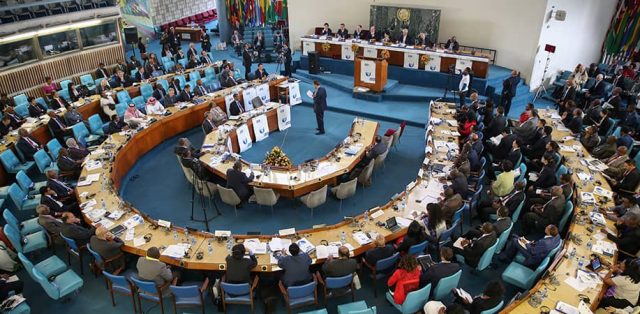Africa
has been slow to convert its natural resources endowments to tangible development
outcomes because of weaknesses in governance, according to the fifth edition of
the African Governance Report published by the UN Economic Commission for
Africa (ECA).
has been slow to convert its natural resources endowments to tangible development
outcomes because of weaknesses in governance, according to the fifth edition of
the African Governance Report published by the UN Economic Commission for
Africa (ECA).
The
report launched during the ongoing ECA Conference of Ministers in Addis Ababa
(Ethiopia) argues that the good governance of natural resources in Africa
requires institutions that have both the proper mandate and capacity to manage
resources efficiently. They also require the capabilities to formulate,
implement and enforce sound policies and regulations.
report launched during the ongoing ECA Conference of Ministers in Addis Ababa
(Ethiopia) argues that the good governance of natural resources in Africa
requires institutions that have both the proper mandate and capacity to manage
resources efficiently. They also require the capabilities to formulate,
implement and enforce sound policies and regulations.
Abdalla
Hamdok, ECA Deputy Executive Secretary and Chief Economist, said although
natural resources had become a central activity on the continent, there remains
serious challenges to achieving sustainable and inclusive growth with value-added
outputs. He explained that good governance is the key to enabling resource-rich
countries to effectively transform their economies.
Hamdok, ECA Deputy Executive Secretary and Chief Economist, said although
natural resources had become a central activity on the continent, there remains
serious challenges to achieving sustainable and inclusive growth with value-added
outputs. He explained that good governance is the key to enabling resource-rich
countries to effectively transform their economies.
‘Africa
is very rich in minerals but has very little value addition to them, leading to
less revenues generated by countries from natural resources,’ said Mr Hamdok
when commenting on the common strategy of exporting commodities in their raw
form. He added: ‘Countries need to critically think on the importance of value
addition for their exports if they want to benefit fully from it.’
is very rich in minerals but has very little value addition to them, leading to
less revenues generated by countries from natural resources,’ said Mr Hamdok
when commenting on the common strategy of exporting commodities in their raw
form. He added: ‘Countries need to critically think on the importance of value
addition for their exports if they want to benefit fully from it.’
Adam
Elhiraika, ECA Director of the Macroeconomic Policy Division, said ownership
rights to natural is the major challenge to good resource governance in Africa.
In relation to economic diversification, he remarked, ‘African countries’ dependent
upon natural resources that are limited lead to economies with an inability to
spread growth to other sectors and across the population.’
Elhiraika, ECA Director of the Macroeconomic Policy Division, said ownership
rights to natural is the major challenge to good resource governance in Africa.
In relation to economic diversification, he remarked, ‘African countries’ dependent
upon natural resources that are limited lead to economies with an inability to
spread growth to other sectors and across the population.’
The
report, based on case studies from eight geographically diverse countries
(Botswana, Cameroon, Cote d’Ivoire, Egypt, Madagascar, Nigeria, Tanzania and
Uganda), drew upon a range of empirical evidence. ‘Among these countries,
Botswana is the only country that has a long term development plan on the
utilization of its natural resources for the benefit of its citizens.’ noted Mr
Elhiraika.
report, based on case studies from eight geographically diverse countries
(Botswana, Cameroon, Cote d’Ivoire, Egypt, Madagascar, Nigeria, Tanzania and
Uganda), drew upon a range of empirical evidence. ‘Among these countries,
Botswana is the only country that has a long term development plan on the
utilization of its natural resources for the benefit of its citizens.’ noted Mr
Elhiraika.
Speaking
at the launch Bience Gawanas, UN Secretary-General’s Special Adviser on Africa,
said, ‘The paradox for African countries is that they are rich in resources yet
they are poor because only very few benefit from these resources.’ She added:
‘Resources should not just increase the GDP of our countries but improve the
lives of our people.’ In addition, she also highlighted that illicit financial
flows and corruption in the continent are make it essential for nations to
exercise good governance of their natural resources. Frequently the direct
exploitation of natural resources – including agriculture, forestry, oil, gas
and minerals – that often dominates economic activity has only benefited the
few in many societies.
at the launch Bience Gawanas, UN Secretary-General’s Special Adviser on Africa,
said, ‘The paradox for African countries is that they are rich in resources yet
they are poor because only very few benefit from these resources.’ She added:
‘Resources should not just increase the GDP of our countries but improve the
lives of our people.’ In addition, she also highlighted that illicit financial
flows and corruption in the continent are make it essential for nations to
exercise good governance of their natural resources. Frequently the direct
exploitation of natural resources – including agriculture, forestry, oil, gas
and minerals – that often dominates economic activity has only benefited the
few in many societies.
Among the
recommendations by the report is the requirement for the strengthening of
institutional and regulatory frameworks to enhance transparency and
accountability in economic governance. Such effective governance is vital for
sustainable development, poverty eradication and socio-economic transformation.
The report recommendations and key messages arising from the discussion will
now contribute to ongoing efforts to strengthen Africa’s natural resources
sector as a stakeholder and enabler of development on the continent.
recommendations by the report is the requirement for the strengthening of
institutional and regulatory frameworks to enhance transparency and
accountability in economic governance. Such effective governance is vital for
sustainable development, poverty eradication and socio-economic transformation.
The report recommendations and key messages arising from the discussion will
now contribute to ongoing efforts to strengthen Africa’s natural resources
sector as a stakeholder and enabler of development on the continent.





